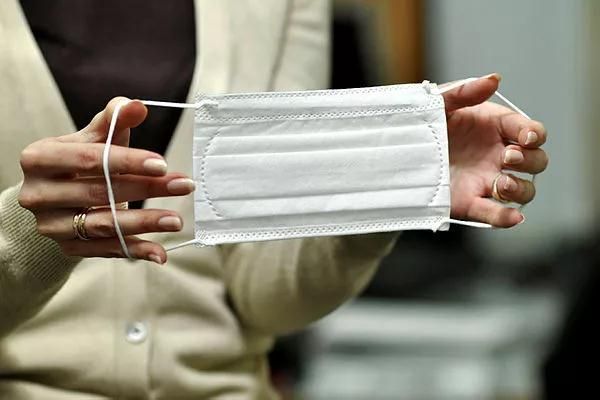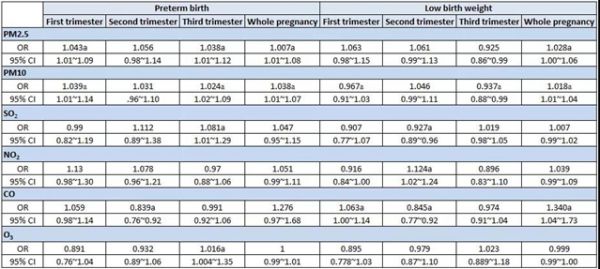低出生体重和早产儿?可能是大气污染惹的祸!
论文标题:The association between air pollution and preterm birth and low birth weight in Guangdong, China
期刊:BMC Public Health
作者:Ying Liu†, Jihong Xu†, Dian Chen, Pei Sun and Xu Ma
发表时间:2019/01/03
数字识别码:10.1186/s12889-018-6307-7
原文链接:https://bmcpublichealth.biomedcentral.com/articles/10.1186/s12889-018-6307-7?utm_source=other&utm_
medium=other&utm_content=null&utm_campaign=BSCN_2_DD_BMCPublicHealth_Arti_Scinet
微信链接:https://mp.weixin.qq.com/s/VSw1M_x1p3Obipd6Ql8CRA
人们的身心健康会受到各种空气污染的影响。最近,越来越多的研究表明,孕妇暴露在污染空气中与早产、低出生体重和死亡率等不良妊娠结局之间存在着潜在关联。近日,来自中国的研究者Ying 等人在BMC Public Health上发表了一篇题为“The association between air pollution and preterm birth and low birth weight in Guangdong, China”的文章,详细揭示了其中的关联性。

在中国,近年来城乡空气质量正在逐渐恶化。中国政府十分重视环境保护问题,例如2016年中国环境保护部实施的“国家环境空气质量标准”中新增了PM和臭氧(O3)的平均浓度限值,以及政府还调整了PM和NO2的浓度极限。来自国家监测中心的数据显示,PM10,PM2.5和SO2的年平均浓度有所下降,而NO2和O3的污染水平有所增加。另外值得注意的是,O3的浓度在逐年增加,O3污染正逐渐取代PM2.5成为中国主要城市的主要空气污染物。而之前的研究关注点更多的在PM,很少有研究关注到O3与低出生体重之间的关系。因此,中国科学院大学的Ying Liu等人在BMC Public Health上最新发表的文章便将研究重点放在了广东省的大气污染物(PM2.5,PM10,SO2,NO2,CO,O3)与早产/低出生体重之间的关系上。
研究人员收集了来自国家免费孕前检查系统(NFPC)从2014年1月1日至2015年12月31日的所有孕产妇数据和出生数据,其中包括孕产妇人口统计信息(例如母亲年龄、教育程度、职业、登记的住所、怀孕时间和孕龄)以及妊娠结局(例如早产儿体重和低出生体重)和婴儿信息(例如婴儿性别,出生体重,分娩时间和胎次)。研究者将1784名早产(n=687)或低出生体重(n=1097)妇女设置为实验组,对照组为1766名有健康出生信息的妇女,并采用logistic回归模型俩评价大气污染物对早产和低出生体重风险的影响。
【注:自2010年以来,NFPC一直得到了中华人民共和国国家卫生和计划生育委员会的支持,这是一项针对希望怀孕的育龄夫妇进行的基于人口的健康调查;广东省的每日空气质量数据来自中国国家环境监测中心。】
Ying Liu等人发现,广东省PM2.5、PM10、SO2、NO2、CO、O3污染水平均低于全国大气污染浓度,并且PM2.5、PM10、SO2、NO2、CO浓度呈明显的季节变化趋势,冬季最高,夏季最低。O3浓度在9月(65.72μg/m3)和10月(84.18μg/m3)相对较高。

图2. 空气污染物的季节性分布
并且他们研究发现,在控制了母亲年龄、教育水平、职业、注册住所、胎龄、婴儿性别、分娩时间、受孕月份和产次等混杂因素的影响后,早产与PM2.5,PM10,SO2,NO2和O3之间存在显着相关性,尤其是在孕早期和孕晚期。
妊娠早期环境中PM2.5、PM10每增加10μg/m3,早产风险会随之增加,在妊娠晚期,环境中每增加10μg/m3 PM2.5、PM10、SO2、O3也会伴随早产风险的增加。而低出生体重风险的增加与妊娠期第一个月和最后一个月时环境中PM2.5、PM10、NO2和O3的浓度有关。此外,他们还发现,9月和10月的O3浓度相对较高,因此建议孕妇应减少或避免在怀孕期间接触这些空气污染物尤其是O3,特别是在怀孕的早期和晚期9/10月份。

表1.妊娠暴露于空气污染与早产/低出生体重的关系
(OR:比值比,表示疾病与暴露之间关联强度的指标;95% CI: 95%置信区间)
同时研究者表明,他们的研究仍有一定的局限性,比如广东省各个城市的监测点数量不同,可能导致了检测数据的不完整,并且与妊娠不良结局相关的其他因素如:社会经济状况、吸烟、海拔等未被考虑入内。因此这类研究还值得被进一步地改进和完善。尽管如此,研究者认为孕期暴露与空气污染物仍然是十分重要的导致妊娠不良的因素,因此他们建议孕妇在怀孕期间应尽量减少或避免接触空气污染,特别是在怀孕的早期和晚期。同时建议相关部门应完善孕产妇健康的公共政策和指导方针,从而降低妇女受空气污染导致早产和新生儿低出生体重的风险。
摘要:
Background
A mountain of evidence has shown that people’s physical and mental health can be affected by various air pollutions. Poor pregnancy outcomes are associated with exposure to air pollution. Therefore, this study aims to investigate the association between air pollutions (PM2.5, PM10, SO2, NO2, CO, and O3) and preterm birth/low birth weight in Guangdong province, China.
Method
All maternal data and birth data from January 1, 2014 to December 31, 2015 were selected from a National Free Pre-pregnancy Check-ups system, and the daily air quality data of Guangdong Province was collected from China National Environmental Monitoring Center. 1784 women with either preterm birth information (n = 687) or low birth weight information (n = 1097) were used as experimental group. Control group included 1766 women with healthy birth information. Logistic regression models were employed to evaluate the effects of air pollutants on the risk of preterm birth and low birth weight.
Results
The pollution levels of PM2.5, PM10, SO2, NO2, CO, and O3 in Guangdong province were all lower than the national air pollution concentrations. The concentrations of PM2.5, PM10, SO2, NO2 and CO had obvious seasonal trends with the highest in winter and the lowest in summer. O3 concentrations in September (65.72 μg/m3) and October (84.18 μg/m3) were relatively higher. After controlling for the impact of confounding factors, the increases in the risk of preterm birth were associated with each 10 μg/m3 increase in PM2.5 (OR 1.043, 95% CI 1.01–1.09) and PM10 (OR 1.039, 95% CI 1.01~1.14) during the first trimester and in PM2.5 (OR 1.038, 95% CI 1.01~1.12), PM10 (OR 1.024, 95% CI 1.02~1.09), SO2 (OR 1.081, 95% CI 1.01~1.29), and O3 (OR 1.016, 95% CI 1.004~1.35) during the third trimester. The increase in the risk of low birth weight was associated with PM2.5, PM10, NO2, and O3 in the first month and the last month.
Conclusion
This study provides further evidence for the relationships between air pollutions and preterm birth/low birth weight. Pregnant women are recommended to reduce or avoid exposure to air pollutions during pregnancy, especially in the early and late stages of pregnancy.
阅读论文全文请访问:
https://bmcpublichealth.biomedcentral.com/articles/10.1186/s12889-018-6307-7?utm_source=other&utm_
medium=other&utm_content=null&utm_campaign=BSCN_2_DD_BMCPublicHealth_Arti_Scinet
期刊介绍:
BMC Public Health(https://bmcpublichealth.biomedcentral.com/,2.420 - 2-year Impact Factor, 3.039 - 5-year Impact Factor) is an open access, peer-reviewed journal that considers articles on the epidemiology of disease and the understanding of all aspects of public health. The journal has a special focus on the social determinants of health, the environmental, behavioral, and occupational correlates of health and disease, and the impact of health policies, practices and interventions on the community.
(来源:科学网)
特别声明:本文转载仅仅是出于传播信息的需要,并不意味着代表本网站观点或证实其内容的真实性;如其他媒体、网站或个人从本网站转载使用,须保留本网站注明的“来源”,并自负版权等法律责任;作者如果不希望被转载或者联系转载稿费等事宜,请与我们接洽。
相关知识
怀孕湿气重 不良习惯惹的祸
大气污染与人体健康
大气污染对孕妇的健康有何影响
室内空气污染对孕妇的危害有多大?
空气污染如何损害我们的健康
重视产前检查,降低早产儿出生率
孕妇应警惕空气污染
生殖健康与环境污染的关系
羊水污染
[环境污染]环境污染与人类健康的关系
网址: 低出生体重和早产儿?可能是大气污染惹的祸! https://www.trfsz.com/newsview41936.html
推荐资讯
- 1从出汗看健康 出汗透露你的健 3677
- 2早上怎么喝水最健康? 3505
- 3习惯造就健康 影响健康的习惯 3204
- 4五大原因危害女性健康 如何保 3090
- 5连花清瘟、布洛芬等多款感冒药 2902
- 6男子喝水喉咙里像放了刀子一样 2401
- 7第二轮新冠疫情要来了?疾控中 2165
- 810人混检核酸几天出结果?1 2155
- 9转阴多久没有传染性?满足四个 2113
- 10打完新冠疫苗后能喝绿豆汤吗? 2013






